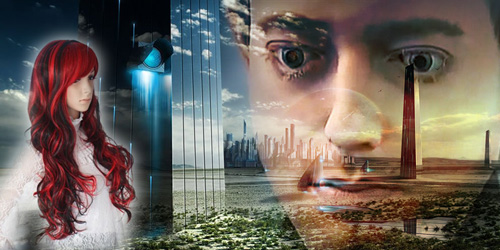Page 1 Page 2 Page 3 Page 4 Page 5 Page 6 Page 7

We walked through the tube leading into the terminal. “Security is straight ahead,” Ollie pointed.
“That may be as far as we get.”
“Trust Wyxa.”
“Palms up, please.” The voice issued from a large flatscreen in front of the gate. Our palms were scanned as we held them up. No fleshlings were in sight here. A droid flight attendant stood at the entrance to the padtube that led to the shuttle.
“Pass through, please.” Wyxa’s hack had superimposed the boys’ palm-lines onto ours. Both imps, of course, contained undated shuttle reservations, required of visitors to the moon.
Ollie went through security first, her body scanned from several angles and displayed in quarter-turns on the screen. A pale skeleton! We don’t have skeletons! How did Wyxa manage that? As I moved along, I watched my illusory skeleton amble like a fleshling’s. Some amazing feat of repixellation.
“Creepy,” said Ollie, taking my hand.
“No suspicious objects detected,” said the monitor. “You may board.”
And so we did, greeting the stewardroid, who was dressed as a male flight attendant — gray chinos and black shirt — but graced with a pretty bald woman’s face. “Take any empty seats you wish,” s/he said. We took two toward the curved rear of the shuttle, facing each other.
“How do you feel?” Ollie whispered, reaching out to squeeze my hand. Her excitement was not of the forni program, but a creation of Wyxa, as was mine. Flooded with synthetic analogs of human endorphins, hormones and other neurotransmitters, we were tense with apprehension and excitement.
“Hyper-ready,” I said. We don’t have pulses, but the excitement permeated my whole body, like millions of tickling nanobots.
The ascent was gentle, escape velocity reached gradually. “Please do not unfasten your seatbelts,” the androgynous stewardroid said with a programmed smile. I looked around at the fidgeting humans, who were probably wishing they could float as we freefell, but the shuttle was too small for roaming about and weightlessness lasted only a moment before we accelerated toward Clarke station, about 150,000 km earthward.
“They think we’re one of them,” I whispered. “I take pleasure in this deceit.”
“I’ve spent my whole life pretending to be one of them,” said Ollie. “My clients paid Hotel Kepler well to make them forget I was a machine. This is more fun. They just assume I am human.” She turned to the window. “Look, the moon is already smaller.”
We had chosen these seats because we knew we’d be able to watch our world shrink. We stared fascinated as it first loomed huge bright and gibbous, then in a few hours became nothing more than a misshapen dirty coin, a piece of fleshling filthy lucre. And there now as we roll the Earth comes into view, beautifully distant, a beckoning blue-white world in the black of space. “We will never see it closer,” I said, “but others of our kind will go there freely, thank Wyxa.”
Between the pebble moon and the looming earth the space station angled in, eclipsing Luna as it grew, its central hub now a giant sphere sprinkled with lines of tiny square porthole lights. Twelve long dock-spokes extended out from its equator, several harboring cargo and passenger ships busy loading and unloading. A few suited and tethered fleshlings bounced around outside the ships and docks, but most of the workers were suitless droids and shining bots. Studding the hub’s poles were shorter stubs that harbored the shuttles. As ours approached its cradle-dock, the stewardroid began distributing sticky-shoes. “Please place these over your shoes,” s/he said. “Use them until inside the station.” A baggage bot collected everyone’s bags, secured them to itself and deshuttled first.
“Make sure no one touches you,” Ollie whispered to me as we left our seats. Her skin was made to feel like flesh, of course, but mine was not. I wore long sleeves, but if someone made contact with my hand they would know instantly that I was not human. We wanted this fact revealed in Clarke, not on the shuttle. They needed to know that we had made it inside the station. Plodding out the shuttle and into the entryway, we removed our sticky-shoes.
“I love this feeling, don’t you?” a male human asked Ollie. “Like the instant the elevator starts to drop. Only this lasts a lot longer!”
Ollie smiled at him. Without stomachs, we couldn’t feel what he felt, but it was no less of a thrill for us. No less exciting because totally new, to float and fling ourselves along on railings. The entryway was wide enough to accommodate the twenty-five people from the shuttle. The humans were, of course, more adept at moving in freefall than Ollie and I; we tended to cling to the railings, launching ourselves carefully from one to the next. Some of the fleshlings were somersaulting, knees tucked and hands clasped around them, rolling along the curved softwalls above the railings. Even though we couldn’t attempt such acrobatics, we thrilled to the feeling of no weight, and wished it would last longer as we approached the doorway. Inside was a lobby in luna-grav, where we would walk as we did on the moon. Beyond that was the station itself, set to terra-grav. To get there, we had to go through another security area. The boys had passports and Terra-tickets stored in their imps, but Wyxa hadn’t cracked the terratype encryption code — yet. The passport pix would obviously not match.
While in line there, as people were busy fingering their palms to access passports and destination tickets, we flicked off the chips. They went for the glowing walls, along which they could move unseen, until they found ingress to their target, Clarke’s mainframe. Not viruses or worms, they were undetectable detectors, code-readers for Wyxa. Once the space station was hacked, Terra’s systems would become reachable.

